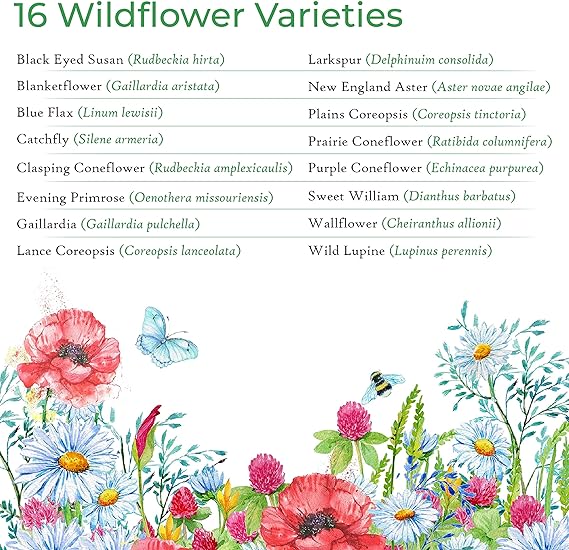| LIFECYCLE | Perennial, Annual |
| PLANTING SEASON | Spring, Summer, Fall |
| LIGHT REQUIREMENTS | Full Sun |
| ZONES | 1-10 |
| BLOOM COLOR | Multi Colored |
| BLOOM PERIOD | Spring, Summer, Fall |
| COVERAGE | Over 325 sq. ft. |
| FEATURES | Attracts Pollinators, Attracts Hummingbirds, Easy to Grow, Low Maintenance |
Iowa Seed Mix Varieties | ||||
| Genus/Species | Common Name | Type | Height (in) | Color |
| Aster novae angliae | New England Aster | P | 24-72" | Purple |
| Centaurea Cyanus | Cornflower | A | 12-36" | Blue or Mix |
| Cheiranthus allionii | Siberian Wallflower | B/P | 10-18" | Orange |
| Coreopsis Ianceolata | Lance-Lvd Coreopsis | P | 18-36" | Yellow |
| Coreopsis tinctoria | Plains Coreopsis | A | 12-36" | Yellow/Maroon |
| Delphinuim Consolida | Larkspur | A | 12-36" | White/Pink/Blue/Violet |
| Dianthus barbatus | Sweet William | P | 12-24" | White/Pink/Red |
| Echinacea Purpurea | Purple Coneflower | P | 24-36" | Purple |
| Gaillardia aristata | Perennial Gaillardia | P | 18-30" | Yellow/Red |
| Gaillardia Pulchella | Annual Gaillardia | A | 12-24" | Yellow/Red |
| Gypsophila Elegans | Annual Baby's Breath | A | 8-18" | White |
| Linum Lewisii | Blue Flax | P | 18-30" | Blue |
| Lupinus Perennis | Perennial Lupine | P | 12-36" | Blue |
| Oenothera Missouriensis | Dwarf Evening Primrose | P | 8-12" | Yellow |
| Papaver Rhoeas | Corn Poppy | A | 12-30" | Red |
| Ratibida Columnifera | Prairie Coneflower | B/P | 12-36" | Yellow |
| Rudbeckia amplexicaulis | Clasping Coneflower | A | 18-30" | Yellow/Red |
| Rudbeckia hirta | Black Eyed Susan | A/B/P | 12-36" | Yellow |
| Silene Armeria | Catchfly | A/B | 16-22" | Pink |
|
A = Annual - 38% P = Perennial - 46% B = Biannual - 16%
| ||||
HOW TO PLANT WILDFLOWER SEEDS IN IOWA
When To Plant
For Spring planting, it is best to plant within a month after the final frost of the winter season. You can begin planting wildflower seeds once the outdoor temperature has reached a minimum of 55°F.
To prevent germination, plant fall seeds after the initial frost. This fall planting strategy provides an early advantage for springtime blossoms in Iowa.
Where To Plant
Though many wildflowers do tolerate some shade, and a few actually thrive in it, the vast majority prefer a sunny environment. It is recommended to plant your Iowa wildflower seeds in an area that receives at least 6 to 10 hours of direct sunlight a day.
How To Plant
Clear the area and soften the soil as best you can before planting your wildflower seeds. For a smaller area, you can scatter the seeds by hand. For larger areas, we recommend a seed spreader to create a better dispersion of the seeds. After the seeds have been sown, lightly compress the seeds into the soil about 1/4" to protect from birds and wind. Keep the soil moist until germination begins.
How To Care For Wildflowers
Although Wildflowers are easy to grow and take care of, there are some steps to keep them looking beautiful. Regularly weed to ensure your wildflowers are getting the nutrients they need. Water your plants during dry spells.
For more information, check out our guide, 'When to Plant Wildflowers in Your State and Region'!
Customer Reviews
Other State Favorites

USDA Zone Map
Learn which wildflowers will perform the best with your geographic region.

Gardening Tips
Not sure of what plants will suit your garden best? Learn more about wildflowers with our resources.



